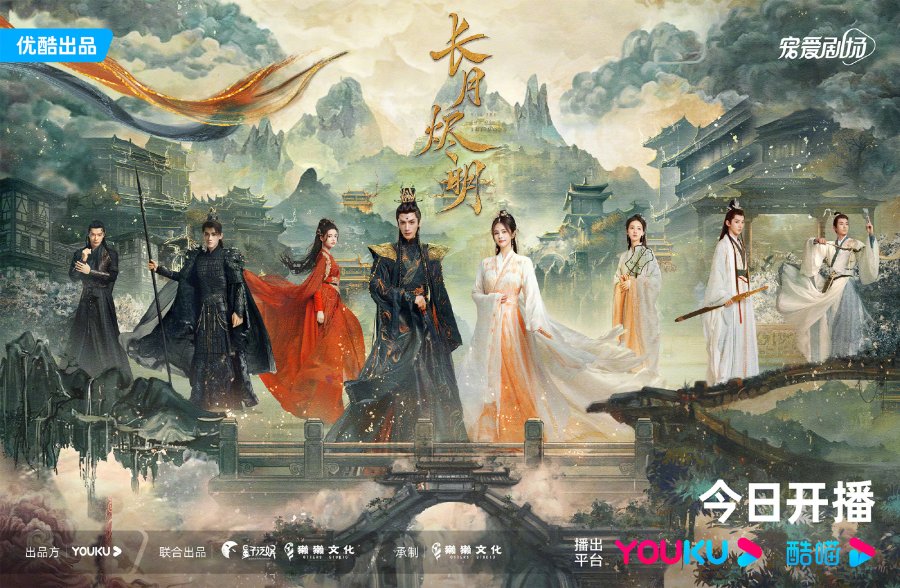A translation of "But the East West Gate" 卻東西門行 by Shen Yue: the poem from which the Chinese title of A Journey to Love (2023) derives
A translation of "But the East West Gate"《卻東西門行》by Shen Yue 沈约, the poem from which the Chinese title of A Journey to Love (2023),《一念關山》, derives
卻東西門行1 But the East West Gate by 沈约 Shen Yue (441AD - 513AD) 驅馬城西阿, On horseback to the west of the City, 望極煙原盡, As far as sight can see, plains shrouded in smoke, 地遠山河沒。 Lands faraway, till the mountains and rivers are no more. 搖裝3非短晨, 還歌豈明發。 So how can a song of return be sung at tomorrow's dawn? 修服悵邊覊, Dressed in mourning and melancholy, Anticipate returning to pay respects at home.4 A galloping canopied chariot becomes a lost dragon5, 樂去哀鏡滿, When joy departs, melancholy enters fully, 歲華委徂貌, The passage of time ruins the appearance, 年霜移暮發。 The frost of the years brings about the white hair of twilight. 辰物久侵晏, The subjects of morning invade the night, 征思坐淪越。 Contemplating transcendence. 清氛掩行夢, Clear clouds of misty air conceal dreams, 憂原盪瀛渤。 The source of worries, the Bo Hai sea. A thought of fortresses and mountains,8 A thousand miles to return back home.9 1. 卻東西門行 "But the East West Gate". I have translated from the traditional Chinese script, but for reference, the simplified Chinese script for 却东西门行 is set out in the box below beneath the footnotes, along with the pin yin for pronunciation.↩ 2. 京闕 - translated above as "the Capital" but it can also mean the "imperial palace".↩
3. 搖裝 is hard to translate – it is a ancient traditional send off tradition in which family and friends will step foot on to the boat before returning, and the boat sets sail with the intended passenger on another day. 4. 鄉謁 describes returning to one's hometown 鄉, to pay respects to one's parents and elders.↩ 5.徂龍 -I have translated this as "lost dragon" above, but it can also mean "travelling dragon" or a dragon that has died. ↩ 6. 引 - I have translated this as "guide", but depending on what other words it is paired with, the word can also mean "to draw back" (as one draws back a bow), "to attract", "to introduce" or "to initiate/ evoke."↩ 7. 歇 - I have translated this as "halts", but the word has a myriad of meanings and can also mean "to rest" or "a moment".↩ 8. 一念起關山 - I have translated this as literally as possible "one thought" or "a thought of fortresses and mountains". But this could also be translated as "thinking of the fortresses and mountains" or "missing the fortresses and mountains". 關 means fortress, usually in relation to those on the borders, 山 means mountains. Together, 關山 describes the frontiers and mountain ranges that delineate and protect the poet’s home country.↩ 9. 丘窟 - I have translated this as "home", for meaning rather than literal sense. Legend had it that when foxes die, their heads were always pointed in the direction of their old cave, ie their 故丘. Hence subsequently "丘窟"/"cave/fox's den" was used to refer to one's home.↩ |
In simplified Chinese, with pin yin to the right:
却东西门行 què dōng xī mén xíng by 沈约 Shen Yue (441AD -513AD) 驱马城西阿, qū mǎ chéng xī ā, 地远山河没。 dì yuǎn shān hé méi.遥眺想京阙。 yáo tiào xiǎng jīng quē. 望极烟原尽, wàng jí yān yuán jǐn, 摇装非短晨, yáo zhuāng fēi duǎn chén, 还歌岂明发。 hái gē qǐ míng fā. 修服怅边羁, xiū fú chàng biān jī, 瞻途眇乡谒。 zhān tú miǎo xiāng yè. 驰盖转徂龙, chí gài zhuǎn cú lóng, 回星引奔月。 huí xīng yǐn bēn yuè. 乐去哀境满, lè qù āi jìng mǎn, 悲来壮心歇。 bēi lái zhuàng xīn xiē. 岁华委徂貌, suì huá wěi cú mào, 年霜移暮发。 nián shuāng yí mù fā. 辰物久侵晏, chén wù jiǔ qīn yàn, 征思坐论越。 zhēng sī zuò lún yuè. 清气掩行梦, qīng fēn yǎn xíng mèng, 忧原荡瀛渤。 yōu yuán dàng yíng bó. 一念起关山, yī niàn qǐ guān shān, 千里顾丘窟。 qiān lǐ gù qiū kū. |














